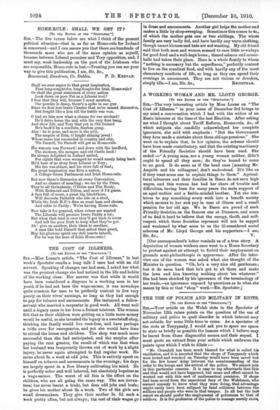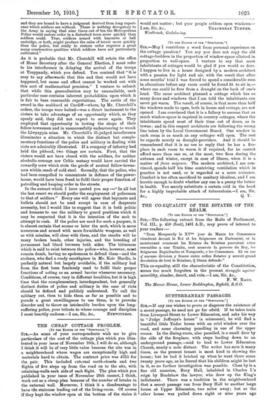THE USE OF POLICE AND MILITARY IN RIOTS.
[To THE EDITOR OF THE " SPECT1TOR."] Snr,—Your article on the Welsh riots in the Spectator of November 12th raises points on the question of the use of military and police to quell disorder in which interest may not subside for some little time to come. As a spectator of the riots at Tonypandy, I would ask you to spare me space to state as briefly as possible the lessons which I believe may be learnt from those disgraceful scenes and their sequel. I must quote an extract from your article which embraces the points upon which I wish to dilate :— "Mr. Churchill has been much blamed for what is called his vacillation, and it is asserted that the shops of Tonypandy which were looted and wrecked on Tuesday would have been saved but for the few hours' delay between the countermanding of the order to the troops and the arrival of the police. We cannot join in this particular censure. It is easy to say afterwards that this and that would not have happened, but cause and effect cannot be worked out with this sort of mathematical precision. If shops had been saved from the anarchical fury of the Welshmen, who seemed scarcely to know what they were doing, that advantage might easily have been eclipsed by fatal collisions between the soldiers and people who were in that temper. In all but the last resort we should prefer the employment of policemen to that of soldiers. It is the profession of the police to manage unruly mobs,
and they are bound to have a judgment derived from long experi- ence which soldiers are without. There is nothing derogatory to the Army in saying that nine times out of ten the Metropolitan Police would restore order in a disturbed town more quickly than soldiers could. True, soldiers armed with bayonets or ball cartridge, or both, might produce the calm of terror more quickly than the police, but really to restore order requires a great many constructive qualifies which soldiers have not particularly cultivated."
As it is probable that Mr. Churchill will retain the office of Home Secretary after the General Election, I must refer to his interference in delaying the arrival of the troops at Tonypandy, which you defend. You contend that "it is easy to say afterwards that this and that would not have happened, but cause and effect cannot be worked out with this sort of mathematical precision." I venture to submit that while this generalisation may be unassailable, each particular case contains inherent probabilities upon which it is fair to base reasonable expectations. The rattle of the sword in the scabbard at Cardiff—where, by Mr. Churchill's orders, the troops were halted—was a direct incitement to the rioters to take advantage of an opportunity which, as they openly said, they did not expect to occur again. They employed that opportunity in looting the shops of their fellow-townsmen and in unsuccessfully endeavouring to wreck the Llwynypia mine. Mr. Churchill's ill-judged interference illuminates a situation in which the distinct but comple- mentary functions of the police and military in dealing with riots are admirably illustrated. If a company of infantry had held the pithead, two things are certain. First, that the rioters would not have closed with the soldiers, for neither alcoholic courage nor Celtic ecstasy would have carried the cowardly crew which stole the goods of neutral fellow-towns- men within reach of cold steel. Secondly, that the police, who had been compelled to concentrate in defence of the power- house, would have been freed to fulfil their proper function of patrolling and keeping order in the streets.
In the extract which I have quoted you say :—" In all but the last resort we should prefer the employment of policemen to that of soldiers." Every one will agree that bayonets and bullets should not be used except in case of desperate necessity, but I would like to suggest that it is both politic and humane to use the military to guard positions which it
may be suspected that it is the intention of the mob to attempt to rush. If the police are used for such a purpose, it is almost certain that sooner or later the mob, which is more numerous and armed with more formidable weapons, as well as with missiles, will close with them, and the results will be
many broken heads, other injuries, and the breeding of permanent bad blood between both sides. The bitterness which is said to exist between the police—who, however, must remain dumb, having no spokesman to defend them—and the strikers, who find a ready mouthpiece in Mr. Keir Hardie, is perfectly natural but largely avoidable, if the military had from the first been fearlessly used to fulfil their proper functions of acting as an armed barrier whenever necessary. Conditions, of course, vary in different localities, but it is high time that the complementary, interdependent, but generally distinct duties of police and military in the case of riots should be defined and publicly understood. To call the military out, then to hide them as far as possible and to parade a great unwillingness to use them, is to provoke disorder and to throw an intolerable burden upon the long- suffering police, your tribute to whose courage and discipline
I most heartily endorse.—I am, Sir, &c., EYEWITNESS.



























































 Previous page
Previous page